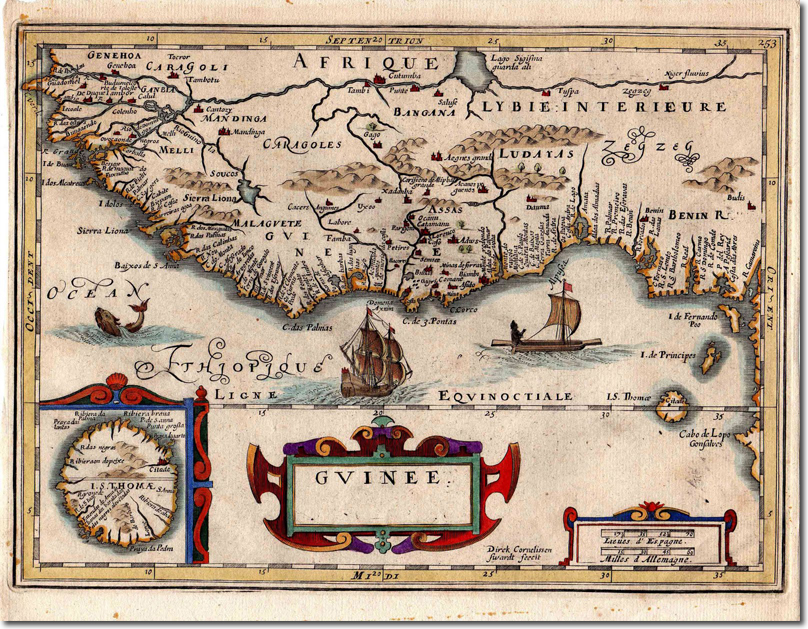|
|


|
|
William Keeling attempted to stage Shakespeare plays off the coast of West Africa (then known as Guinea) to a presumably bemused local audience.
William Keeling was a naval officer in the East India Company of unknown parentage, his date of birth being calculated from his supposed age of forty-two at death. His ability to deal with eastern potentates suggests that he was 'socially a cut above the average sea captain'. He spoke Arabic and Malay well. Given his skill in merchandising, he may have served an apprenticeship with a London livery company. He is also said to have served the Levant Company. Keeling was appointed captain of the Susan in the second East India Company voyage under Sir Henry Middleton, which sailed on 25 March 1604. They arrived at Bantam on 23 December 1604, with crews much reduced and enfeebled by sickness. Middleton sailed for the Moluccas on 18 January 1605, leaving two ships, the Susan and the Hector, to load pepper. When the captain of the Hector died Keeling transferred to her, and the two ships left Bantam for England on 4 March 1605. Nine months elapsed before the Hector reached the Cape of Good Hope, by which time the crew was reduced to fourteen and the Susan had disappeared. They were fortunate to meet and obtain help there from Middleton. The fleet reached the Downs on 6 May 1606. Keeling had done well, and while still in his twenties was appointed general of the third East India Company voyage, with detailed orders to continue trade with Java and to open up commerce with India and Aden. Though Keeling's original journal of the voyage is lost, a drastically abridged version was published by Samuel Purchas. Three ships left Tilbury on 12 March 1607 and were almost immediately scattered by storms. David Middleton made a fast voyage in the Consent to the Moluccas and back, but Keeling and William Hawkins, in the Dragon and Hector respectively, had a much harder and slower voyage; in the course of it the crews allegedly staged early performances of Hamlet and Richard II. Though an attempt to reach Aden failed, the Hector under Hawkins became the first English ship to reach India. The crew of the Dragon frustrated Keeling's plan to sail to the Moluccas, but on meeting the Hector, Keeling transferred to her, obtained a cargo of cloves in the Banda Islands despite Dutch opposition, stirred up local resistance to the Dutch, and discovered the Cocos (or Keeling) Islands in 1609; he arrived back in England on 10 May 1610. Keeling married Ann Broomefield (d. 1631), possibly his second wife, on 25 September 1610. No more is heard of him until September 1614 when the East India Company appointed him for five years to reorganize their trading establishments in Asia, preferring him, in view of his skill in merchandise, to Thomas Best, a difficult man but the better navigator and commander. Christopher Newport went as vice-admiral to supplement navigational expertise. Keeling wished to take his pregnant wife with him and smuggled her aboard, but was refused permission and threatened with dismissal until he put her ashore. The fleet left the Downs on 23 February 1615, carrying Sir Thomas Roe to be first ambassador to the Mughal emperor. Keeling worked hard in the East, and established a factory at Teko in Sumatra. Keeling badly missed his wife, however, suffered ill health, and was relieved when the company reluctantly agreed to his return though the work of reorganization was still incomplete. He reached England in May 1617. Keeling was subsequently appointed captain of Cowes Castle and groom of the bedchamber to James I. Sir John Oglander described him as a brave and noble fellow, noted for his hospitality. Keeling made his will on 6 October 1620 and was buried in Carisbrooke church three days later, leaving at least three children. His curious monument, erected by his 'loveing & sorrowfvll wife', wrongly stated his date of death as 19 September 1619. A rich widow, according to Oglander, she remarried on 9 April 1621. This Picture is courtesy of Bardfilm: The Evidence for Shakespeare off the Coast of Africa |
Armed Forces | Art and Culture | Articles | Biographies | Colonies | Discussion | Glossary | Home | Library | Links | Map Room | Sources and Media | Science and Technology | Search | Student Zone | Timelines | TV and Film